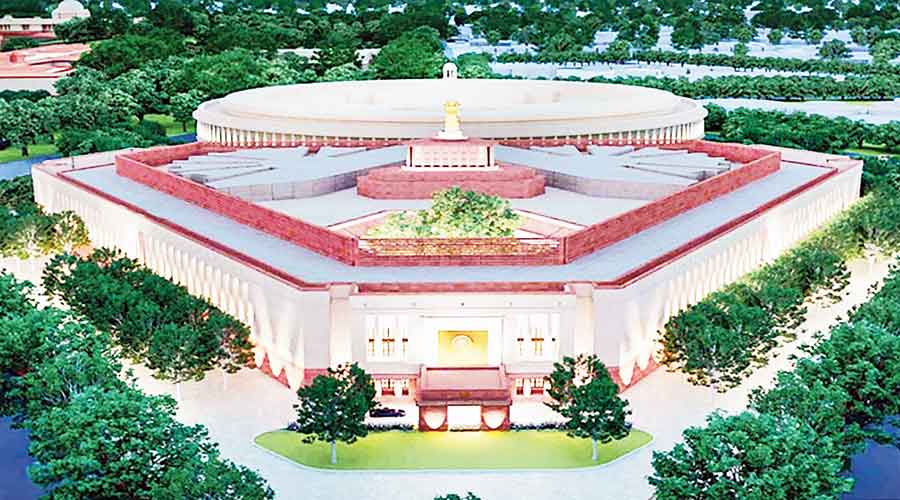Justice Sanjiv Khanna, the dissenting judge in the Central Vista case, on Tuesday quashed the Centre’s gazette notification for the construction of the project, saying several statutory provisions such as “change of land use” and “environmental clearance” were ignored by the government despite massive public objections.
Although the majority verdict by Justices A.M. Khanwilkar and Dinesh Maheshwari has upheld the construction of the Rs 20,000-crore Central Vista project, Justice Khanna’s stinging rebuke is an embarrassment for the Centre as the dissenting judge has slammed it for lack of transparency.
“Citizens’ right to know and the government’s duty to inform are embedded in the democratic form of governance as well as the fundamental right to freedom of speech and expression. Transparency and receptiveness are two key propellants as even the most competent and honest decision-makers require information regarding the needs of the constituency as well as feedback on how the extant policies and decisions are operating in practice.
“This requires free flow of information in both directions. When information is withheld/denied, suspicion and doubt gain ground and the fringe and vested interest groups take advantage. This may result in social volatility,” Justice Khanna noted.
The dissenting judge, however, said it did not mean that consultation should be open-ended and indefinite, or the government must release all information, as disclosure of certain information may violate the right to privacy of individuals, cause breach of national security and impinge on confidentiality.
“Information may be abridged or even denied for larger public interest. This implies that there should be good grounds and justification to withhold information. Boundaries of what constitutes legitimate withholding can at times be debatable; but in the present case, there is no contestation between transparency and the right to know on the one hand, and the concerns of privacy, confidentiality and national security on the other,” Justice Khanna said.
The judge said “it would be hypothetical and incongruous to accept that the L&DO (land and development officer) had applied its mind to the objections and suggestions even before the public hearing, and therefore the court should assume that the central government had considered the objections and suggestions”.
The government had argued that the court must assume that the Centre had addressed the concerns although it could not place the relevant materials in the public domain.
“The final decision must be conscientiously and objectively taken by the competent authority post the hearing. The central government has not placed on record even a single document or minutes to show that the objections and suggestions were considered by the central government…,” Justice Khanna said.
The dissenting judge noted that the Board of Enquiry for Heritage (BoEH), apart from noting the submissions, objections and suggestions of those who appeared at the hearing, did not deliberate or record specific reasons.
Having interacted with the public, the BoEH did find merit in the objections regarding the absence and lack of information in the public domain and took specific note of the public anxiety and “misgivings”.
Justice Khanna noted that the minutes of the BoEH meetings were an “incontrovertible acknowledgement” of the fact that regarding the present and proposed land use, “no plans, layouts, drawings etc., or written matter explanatory or of descriptive nature to illustrate or explain the proposed changes and project were put in the public domain”.
“The BoEH had therefore thoughtfully recommended the need to address lack of transparency concern by all departments”, which was not considered by the government, Justice Khanna said.
According to the dissenting judgment, “intelligible and adequate disclosure of information” in the context of the Development Act and the Development Rules means and refers to the degree to which information should be available to the public to enable them to have an informed voice in the deliberative decision-making legislative exercise before a final decision is taken on the proposals.
“In the present matter this lapse and failure was acknowledged and accepted by the BoEH, which had recommended disclosure and furnishing of details,” Justice Khanna noted.
“Intelligible and adequate disclosure was critical given the nature of the proposals which would affect the iconic and historical Central Vista. The citizenry clearly had the right to know intelligible details explaining the proposal to participate and express themselves, give suggestions and submit objections.
“The proposed changes, unlike policy decisions, would be largely irreversible. Physical construction or demolition once done, cannot be undone or corrected for future by repeal, amendment or modification as in case of most policies or even enactments,” Justice Khanna said.











